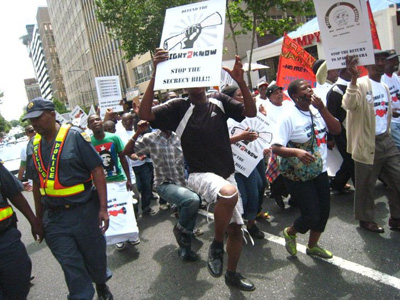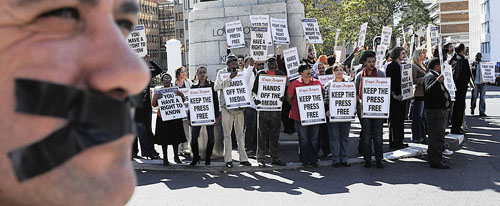On October 19, 1977, South Africa’s government banned The World newspaper, along with Weekend World, the paper’s weekly magazine, and Pro Veritate, a Christian publication. Authorities also detained scores of activists and outlawed 17 anti-apartheid groups during the one-day crackdown, which came to be known as Black Wednesday.
When apartheid ended in 1994, the date was recast as an annual holiday: South Africa’s National Day of Media Freedom. But judging by an unusual protest march marking this year’s celebration in Johannesburg, the past has never been so relevant to the present.
Sporting T-shirts reading “I demand the right to know,” waving signs and placards reading “Stop the Secrecy Bill,” dozens of protesters, often with bands of black tape covering their mouths, marched in silence last Tuesday from Witwatersrand University to the Constitutional Hill.
Their march was organized by the Right2Know Campaign, a coalition of some 350 civil society organizations and more than 10,000 individuals opposing the government’s Protection of Information Bill and the ruling African National Congress’ (ANC) proposal for a media tribunal. Among the marchers were Sunday Times reporter Mwazili wa Afrika, who made headlines earlier this summer when he was arrested on false charges while investigating information critical of a local ANC official.

“This year we actually want to make sure that issues of media freedom are very much highlighted and media freedom is actually seen by South Africans as something that’s theirs. It doesn’t belong to the media. It belongs to the ordinary person,” veteran journalist Mondli Makhanya and chair of the South African National Editors Forum (SANEF) told me.
“We have a democratic government, but that very democratic government is launching incursions in the media freedom space, and it is something that we need to nip in the bud,” he added. “We cannot allow it.”
Last week, SANEF and Print Media South Africa identified a new threat: the Protection From Harassment Bill. Intended to target and criminalize the act of stalking and protect privacy, this legislation could also seriously limit the work of journalists by making traditional and legitimate aspects of a reporter’s work illegal.
There is a feeling of urgency among South Africa’s media leaders, as press freedoms now face the kind of legal challenges that haven’t been seen since the end of apartheid.
Pushback from the media and civil society has yielded some results. Legislators revised the Protection of Information Bill to remove the vaguely-defined “national interest” as an all-encompassing, unchallengeable justification for classifying official information. And a week ago, after a meeting with SANEF, Deputy President Kgalema Motlanthe publicly suggested the ANC could drop its media tribunal proposal if the press reforms its mechanisms for self-regulation.
The government has resisted many other demands, however. including limiting the scope of the information bill to government employees or allowing “public interest” legal protections for journalists. Speaking to parliament on Friday, Security Minister Siyabonga Cwele rejected accusations that the government was trying to hide any wrongdoings my muzzling the press.
“We are legislating for real problems and are not seeking to cover up corruption,” Cwele said. Such “real problems,” he added, include espionage, terrorism and “‘unlawful acts against the constitutional order.”
For one veteran journalist who was a victim of the Black Wednesday crackdown, the government’s recent stance feels hauntingly familiar. Joe Latakgomo, who worked as a World reporter in 1977 and went on to found the Sowetan newspaper, wrote a column in September called “How Can We Forget?” Recounting the abuses of the apartheid regime, many committed in the name of the “national interest,” he demanded, “How can we so quickly forget what the result of gagging the media could be?”
